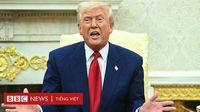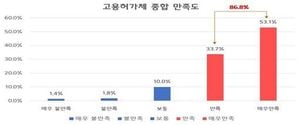As the global economy continues to grapple with the ramifications of shifting trade policies, President Donald Trump has made significant announcements regarding tariffs that will impact both American consumers and international businesses. On April 12, 2025, during a press briefing aboard Air Force One, Trump revealed that he would provide further details on tariffs imposed on imported semiconductors on April 14, 2025. This comes amid a backdrop of increasing tensions and uncertainty in international trade.
In a notable shift, the Trump administration has announced that certain electronics and high-tech products imported into the United States will be exempt from tariffs under the new tariff policy. This includes smartphones, computers, and other electronics that had previously faced steep tariffs, including a staggering 125% tax on imports from China. The U.S. Customs and Border Protection Agency confirmed this exemption on April 11, 2025, indicating that these items would no longer be subject to the 10% global tax applied to most countries.
The decision to waive these tariffs has been welcomed by many in the tech industry, who had expressed concerns that prices for essential devices could skyrocket as a result of the tariffs. Dan Ives, a global technology analyst at Wedbush Securities, described the exemption as a "game-changing scenario" for tech investors, noting that it alleviates some of the financial pressure on companies like Apple, Nvidia, and Microsoft.
However, even with these exemptions, the situation remains complex. The Trump administration has temporarily suspended retaliatory tariffs for 90 days, applying only a minimum tax rate of 10% to countries that do not respond to U.S. tariffs. Yet, imports from China will still face a hefty 145% tariff, a move Trump justified by citing China's willingness to impose an 84% tax on U.S. goods.
In the wake of these announcements, many European companies are scrambling to adapt. With the U.S. being a vital market for European exports—accounting for over 20% of total EU exports last year—businesses are facing increased operational costs. European firms are stockpiling goods, reevaluating supply chains, and even relocating production facilities to maintain their foothold in the U.S. market. For instance, Audi, the German luxury car manufacturer, has temporarily halted imports into the U.S., while Sogrape SA, Portugal's largest wine exporter, will utilize a six-month reserve prepared for this situation.
In a related development, Novartis AG, a Swiss pharmaceutical giant, announced plans to invest $23 billion in U.S. operations over the next five years. This investment aims to bolster domestic production and ensure that critical medications are manufactured within the United States. Similarly, Unilever is set to build an $800 million factory in Mexico, primarily for products destined for the U.S. and Canadian markets, despite the looming uncertainties surrounding Trump's new tax policies.
As companies navigate these turbulent waters, many are taking proactive measures to mitigate the impact of tariffs. Mercedes-Benz Group AG is racing to import high-end models before anticipated price increases take effect, while Volvo Car AB plans to ramp up production at its South Carolina facility. Volkswagen AG has also warned U.S. dealers to expect import-related surcharges, effectively shifting the financial burden onto American consumers.
In the broader context, the European automotive industry is facing significant challenges, particularly as sales have declined in both the EU and China in recent years. The U.S. has become increasingly important for European manufacturers, with American consumers showing a strong preference for SUVs and pickup trucks, which tend to offer higher profit margins. However, the combination of the 10% base tax and the 25% tariffs on steel, aluminum, and auto exports will likely have a profound effect on the industry.
For example, Audi's Q5, one of the brand's best-selling models in the U.S., is now subject to an effective tax rate exceeding 52%. This includes a 25% import tax on vehicles, another 25% for goods sourced from China, and a 2.5% penalty for non-compliance with trade agreements established during Trump's first term. As a result, companies like Mercedes are assessing their tariff strategies to understand the full implications of these changes.
Meanwhile, Backmarket, a French company specializing in refurbished electronics, has seen its U.S. sales double recently, capitalizing on the anticipated price increases from major tech companies. CEO Thibaud Hug de Larauze noted that as new products become more expensive due to tariffs, refurbished items may become more appealing to cost-conscious consumers.
In the textile industry, Scottish tweed manufacturers are bracing for further challenges. Already impacted by Brexit, these companies are now preparing for the effects of U.S. tariffs. Peter Christian, a men's clothing brand, has implemented a 10% discount for U.S. customers, cleverly marketed as a "reverse tariff." Renzo Rosso, founder of the Italian fashion brand Diesel, acknowledged that price increases in the U.S. are unavoidable, stating, "I don’t have many options right now. Consumers are very hesitant to shop."
Despite the challenges, some businesses are finding silver linings. Tom Ryder, CEO of Applied Nutrition, expressed optimism that retaliatory tariffs on American products could benefit European companies, as they might become more attractive in markets like Canada, Japan, and China. "British brands could become more appealing in those markets as American products become pricier," he remarked.
As the trade landscape continues to evolve, companies on both sides of the Atlantic are responding with a mix of caution and strategic planning, aiming to navigate the complexities of tariffs and maintain their competitive edge in a rapidly changing global economy.






